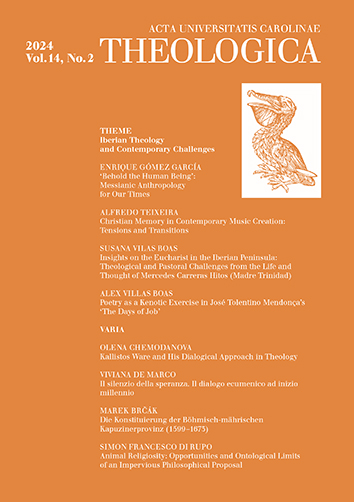AUC Theologica is a peer-reviewed journal for theology published twice a year. As we publish original papers in English, German, French, and Italian, our mission is to serve as a platform both for Czech researchers, who can present their research results in these languages, and for international contributors, who are invited to enter the academic theological discussion in the heart of Europe.
The journal focuses on a wide range of theological disciplines, such as systematic theology, biblical studies, patristic studies, pastoral and spiritual theology, religious education, church history, etc. Within these fields, the journal seeks to reflect the current theological questions and problems, which often requires interdisciplinary approaches. Supporting the intersection of various theological disciplines, we thus also welcome theological papers touching other academic fields including philosophy, sociology, literary studies, and science.
Each issue consists of two sections. The thematic section presents papers of the same focus. The section called ‘Varia’ invites papers dealing with various theological themes from the perspective of all Christian traditions. Our current and past issues are approachable for free on this website in the form of Open Access.
AUC THEOLOGICA, Vol 4 No 1 (2014), 87–114
De religione: How Christianity Became a Religion
Denisa Červenková
DOI: https://doi.org/10.14712/23363398.2015.17
published online: 02. 10. 2014
abstract
Following the findings of contemporary theological and religious studies research, the present interdisciplinary study attempts to trace the process of adopting the originally Roman category of “religion” for referring to Christianity. The text notes, in particular, the socio-political role of religio in classical culture and the transformations that the relationship of the society of classical antiquity and the Christian community went through in the first centuries AD, especially the first Christian attempts at communication with the late classical Latin culture and the administrative structures of the Roman Empire. The adaptation of the category is traced back to Tertullian, whose conception appears to have fundamentally influenced later generations of Christians; the second part of the study therefore devotes considerable attention to his works. It is here that justified use of the category of “religion” in connection with the Christian tradition is first encountered, as an expression encompassing the doctrinal and philosophical, as well as ethical and liturgical aspects of Christianity. Analysis of the text of Tertullian’s Apologeticum shows how the apologetic literature of the second century AD conveys the Christian message in an exemplary and highly elaborate form, which serves the dual purpose of providing an adequate definition of the Christian religious identity and preserving it, as well as making it available to recipients of diverse contemporary cultural environments. De religione: Jak se křesťanství stalo náboženstvím Předkládaná interdisciplinární studie se v návaznosti na poznatky současného teologického a religionistického bádání snaží vystopovat proces převzetí původně římské kategorie „náboženství“ pro označení křesťanství. V textu se připomíná zejm. sociopolitická role religio v antické kultuře a proměny, jimiž procházel vztah antické společnosti a křesťanského společenství v prvních staletích po Kristu, zejm. první vstřícné pokusy o dorozumění křesťanů s pozdněantickou latinskou kulturou a správními strukturami Římské říše. První stopy adaptace zmíněné kategorie se objevily u Tertuliána, jehož pojetí zřejmě zásadně ovlivnilo další generace křesťanů, proto je v druhé části studie věnována značná pozornost jeho spisům. Právě zde se poprvé setkáváme se zdůvodněným užitím kategorie „náboženství“ v souvislosti s křesťanskou tradicí, jako s výrazem zahrnujícím jak naukově-filozofický, tak etický a liturgický aspekt křesťanství. Analýza textu Tertuliánova Apologetika ukazuje, jak konkrétně právě apologie druhého století po Kristu zprostředkovávají křesťanské poselství příkladnou a velmi propracovanou formou, která v sobě spojuje jak úsilí o adekvátní definici a uchování vlastní náboženské identity, tak snahu o jeho zpřístupnění adresátům různých soudobých kulturních prostředí.
keywords: Early Latin theology; Tertullian; Apologeticum; Religio; Religious identity; Inculturation of Christianity raná latinská teologie; Tertulián; Apologeticum; religio; náboženská identita; inkulturace křesťanství

De religione: How Christianity Became a Religion is licensed under a Creative Commons Attribution 4.0 International License.
148 x 210 mm
periodicity: 2 x per year
print price: 100 czk
ISSN: 1804-5588
E-ISSN: 2336-3398
